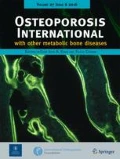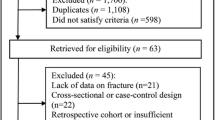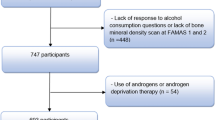Abstract
High intakes of alcohol have adverse effects on skeletal health, but evidence for the effects of moderate consumption are less secure. The aim of this study was to quantify this risk on an international basis and explore the relationship of this risk with age, sex, and bone mineral density (BMD). We studied 5,939 men and 11,032 women from three prospectively studied cohorts comprising CaMos, DOES, and the Rotterdam Study. Cohorts were followed for a total of 75,433 person-years. The effect of reported alcohol intake on the risk of any fracture, any osteoporotic fracture, and hip fracture alone was examined using a Poisson model for each sex from each cohort. Covariates examined included age and BMD. The results of the different studies were merged using weighted β-coefficients. Alcohol intake was associated with a significant increase in osteoporotic and hip fracture risk, but the effect was nonlinear. No significant increase in risk was observed at intakes of 2 units or less daily. Above this threshold, alcohol intake was associated with an increased risk of any fracture (risk ratio [RR]=1.23; 95% CI, 1.06–1.43), any osteoporotic fracture (RR=1.38; 95% CI, 1.16–1.65), or hip fracture (RR=1.68; 95% CI, 1.19–2.36). There was no significant interaction with age, BMD, or time since baseline assessment. Risk ratios were moderately but not significantly higher in men than in women, and there was no evidence for a different threshold for effect by gender. We conclude that reported intake of alcohol confers a risk of some importance beyond that explained by BMD. The validation of this risk factor on an international basis permits its use in case-finding strategies.

Similar content being viewed by others
References
Seeman E, Melton LJ III, O’Fallon WM, Riggs BL (1983) Risk factors for spinal osteoporosis in men. Am J Med 75:977–983
Holbrook TL, Barrett-Connor E (1993) A prospective study of alcohol consumption and bone mineral density. BMJ 306:1506–1509
Johnell O, Kristenson H, Redlund-Johnell I (1985) Lower limb fractures and the registration for alcoholism. Scand J Soc Med 13:95–97
Felson DT, Zhang Y, Hannan MT et al (1995) Alcohol intake and bone mineral density in elderly men and women. The Framingham Study. Am J Epidemiol 142:485–492
Orwoll ES, Bevan L, Phipps KR (2000) Determinants of bone mineral density in older men. Osteoporos Int 11:815–821
Hoidrup S, Gronbaek M, Gottschau A, Lauritzen JB, Schroll M and the Copenhagen Centre for Prospective Population Studies (1999) Alcohol intake, beverage preference and risk of hip fracture in men and women. Am J Epidemiol 149:933–1001
Nguyen TV, Eisman JA, Kelly PJ, Sambrook PN (1996) Risk factors for osteoporotic fractures in elderly men. Am J Epidemiol 144:255–263
Tuppurainen M, Kroger H, Honkanen R, Puntila E, Huopio J, Saarikoski S, Alhava E (1995) Risks of perimenopausal fractures: a prospective population based study. Acta Obstet Gynecol Scand 74:624–628
Felson DT, Kiel DP, Anderson JJ, Kannel WB (1988) Alcohol consumption and hip fractures: the Framingham Study. Am J Epidemiol 128:1102–1110
Fujiwara S, Kasagi F, Yamada M, Kodama K (1997) Risk factors for hip fracture in a Japanese cohort 12:998–1004
National Osteoporosis Foundation (1998) Osteoporosis: review of the evidence for prevention, diagnosis and treatment and cost-effectiveness analysis. Osteoporos Int 8[Suppl 4]:1–88
National Osteoporosis Foundation (1998) Physician’s guide to prevention and treatment of osteoporosis. NOF, Washington DC, pp 1–38
American College of Rheumatology (2001) Recommendations for the prevention and treatment of glucocorticoid-induced osteoporosis. Ad Hoc Committee on Glucocorticosteroid-Induced Osteoporosis. Arthritis Rheum 44:1496–1503
Kanis JA, Delmas P, Burckhardt P, Cooper C, Torgerson D on behalf of the EFFO (1997) Guidelines for the diagnosis and management of osteoporosis. Osteoporos Int:7:390–406
Royal College of Physicians (1999) Osteoporosis: clinical guidelines for prevention and treatment. RCP, London
Royal College of Physicians (2000) Osteoporosis: clinical guidelines for prevention and treatment. Update on pharmacological interventions and an algorithm for management. RCP, London
Brown JP, Josse RG, for the Scientific Advisory Council of the Osteoporosis Society of Canada (2002) 2002 clinical practice guidelines for the diagnosis and management of osteoporosis. Can Med Ass J 167[Suppl 10]:S1–S34
European Commission (1998) Report on osteoporosis in the European Community: action on prevention. Luxembourg Office for Official Publications of the European Communities, Luxembourg, p 112
Kreiger N, Tenenhouse A, Joseph L et al (1999) The Canadian Multicenter Osteoporosis Study (CaMos): background, rationale, methods. Can J Aging 18:376–387
Jones G, Nguyen TV, Sambrook PN, Kelly PJ, Gilbert C, Eisman JA (1994) Symptomatic fracture incidence in elderly men and women. The Dubbo Osteoporosis Epidemiology Study, DOES. Osteoporos Int 4:277–282
Hofman A, Grobbee DE, De Jong PT, van den Ouweland FA (1991) Determinants of disease and disability in the elderly: the Rotterdam study. Eur J Epidemiol 7:403–422
De Laet CEDH, Van Hout BA, Burger H, Hofman A, Weel AEAM, Pols HAP (1998) Hip fracture prediction in elderly men and women: validation of the Rotterdam study. J Bone Miner Res 13:1587–1593
Kanis JA, Oden A, Johnell O, Jonsson B, De Laet C, Dawson A (2001) The burden of osteoporotic fractures: a method for setting intervention thresholds. Osteoporos Int 12:417–427
Johnell O, Gullberg B, Kanis JA, Allander E, Elffors L, Dequeker J, Dilsen G, Gennari C, Lopez Vaz A, Lyritis G, Mazzuoli GF, Miravet L, Passeri M, Perez Cano R, Rapado A, Ribot C (1995) Risk factors for hip fracture in European women: the MEDOS study. J Bone Miner Res 10:1802–1815
Midanik LT (1988) Validity of self-reported alcohol use: a literature review and assessment. Br J Addict 83:1019–1030
Standing Medical Advisory Committee to the Secretaries of State for Health and for Wales (1989) Drinking problems: a challenge for every doctor. HMSO, London
La Vecchia C, Negri E, Levi F et al (1991) Cigarette smoking, body mass and other risk factors for fractures of the hip in women. Int J Epidemiol 20:671–677
Grisso JA, Kelsey JL, O’Brien LA et al (1997) Risk factors for hip fracture in men. Am J Epidemiol 145:786–793
Grisso JA, Kelsey JL, Strom BL et al (1991) Risk factors for falls as a cause of hip fracture in women. N Engl J Med 324:1326–1331
Cumming RG, Klineberg RJ (1994) Case-control study of risk factors for hip fractures in the elderly. Am J Epidemiol 139:493–503
Kanis JA, Johnell O, Gullberg B, Allander E, Elffors L, Ranstam J, Dequeker J, Dilsen G, Gennari C, Lopez Vaz A, Lyritis G, Mazzuoli G, Miravet L, Passeri M, Perez Cano R, Rapado A, Ribot C (1999) Risk factors for hip fracture in men from Southern Europe: the MEDOS study. Osteoporos Int 9:45–54
Paganini-Hill A, Chao A, Ross RK et al (1991) Exercise and other factors in the prevention of hip fracture: the Leisure World Study. Epidemiology 2:16–25
Huang Z, Himes JH, McGovern PG (1996) Nutrition and subsequent hip fracture risk among a national cohort of white women. Am J Epidemiol 144:124–134
Cummings SR, Nevitt MC, Browner WS, Stone K, Fox KM, Ensrud KE, Cauley J, Black D, Vogt TM for the Study of Osteoporotic Fractures Research Group (1995) Risk factors for hip fracture in white women. N Engl J Med 332:767–773
Hemenway D, Azrael DR, Rimm EB, Feskanich D, Willet WC (1994) Risk factors for hip fracture in US men aged 40 through 75 years. Am J Public Health 84:1843–1845
Holbrook TL, Barrett-Connor E, Wingard DL (1988) Dietary calcium and risk of hip fracture: 14-year prospective population study. Lancet 2:1046–1049
Huopio J, Kroger H, Honkanen R, Saarikoski S, Alhava E (2000) Risk factors for perimenopausal fractures: a prospective study. Osteoporos Int 11:219–227
Sowers MR, Clark MK, Hollis B, Wallace RB, Jannausch M (1992) Radial bone mineral density in pre- and perimenopausal women: a prospective study of rates and risk factors for loss. J Bone Miner Res 7:647–657
Roy DK, O’Neill TW, Finn JD et al (2003) Determinants of incident vertebral fracture in men and women: results from the European Prospective Osteoporosis Study (EPOS). Osteoporos Int 14:19–26
Laitinen K, Valimaki M (1991) Alcohol and bone. Calcif Tissue Int 49[Suppl]:S70–S73
Dymling JF, Ljungberg O, Hillyard CJ, Greenberg PB, Evans IMA, MacIntyre I (1976) Whiskey: a new provocative test for calcitonin secretion. Acta Endocrinol 82:500–509
Rico H (1990) Alcohol and bone disease. Alcohol 25:345–352
Malmivaara A, Heliovaara M, Knekt P et al (1993) Risk factors for injurious falls leading to hospitalisation or death in a cohort of 19,500 adults. Am J Epidemiol 138:384–394
Gunnes M, Mellstrom D, Johnell O (1998) How well can a previous fracture indicate a new fracture? A questionnaire study of 29,802 postmenopausal women. Acta Orthop Scand 69:508–512
Ensrud KE, Nevitt MC, Yunis C, Cauley JA, Seeley DG, Fox KM et al (1994) Correlates of impaired function in older women. J Am Geriatr Soc 42:481–489
Nelson HD, Nevitt ME, Scott JC, Stone KL, Cummings SR (1994) Smoking, alcohol and neuromuscular and physical function of older women. JAMA 272:1825–1831
Kanis JA (2002) Diagnosis of osteoporosis and assessment of fracture risk. Lancet 359:1929–1936
Delmas PD, Eastell R, Garnero P, Seibel MJ, Stepan J (2000) The use of biochemical markers of bone turnover in osteoporosis. Osteoporos Int 11[Suppl 6]:S2–S17
Guidelines Writing Group (2002) Glucocorticoid-induced osteoporosis: guidelines for prevention and treatment. Bone and Tooth Society of Great Britain, National Osteoporosis Society, and Royal College of Physicians. RCP, London
Klotzbeucher CM, Ross PD, Landsman PB, Abbot TA, Berger M (2000) Patients with prior fractures have an increased risk of future fractures: a summary of the literature and statistical synthesis. JBMR 15:721–739
Van Staa TP, Leufkens HGM, Cooper C (2002) Does a fracture at one site predict later fractures at other sites? A British cohort study. Osteoporos Int 13:624–629
Acknowledgements
We are grateful to the International Osteoporosis Foundation, National Osteoporosis Foundation, International Society for Clinical Densitometry, and the European Community (EU FP 3/5) for their support. We gratefully acknowledge G-E Lunar, Lilly, Hologic, Roche, IGEA, the Alliance for Better Bone Health, Novartis, and Wyeth for their unrestricted support of this work.
Author information
Authors and Affiliations
Corresponding author
Rights and permissions
About this article
Cite this article
Kanis, J.A., Johansson, H., Johnell, O. et al. Alcohol intake as a risk factor for fracture. Osteoporos Int 16, 737–742 (2005). https://doi.org/10.1007/s00198-004-1734-y
Received:
Accepted:
Published:
Issue Date:
DOI: https://doi.org/10.1007/s00198-004-1734-y




